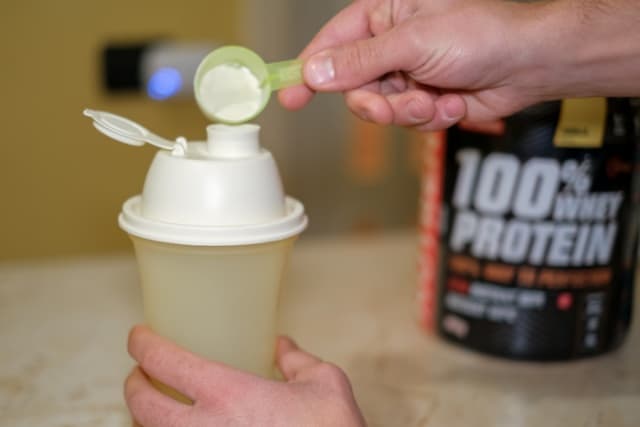Can Pre-workout Cause Bloating & Digestive Problems?
Max Health Living is a reader-supported site. Purchases made through links may earn a commission. Learn more.
In this article, I’ll be discussing the ways pre-workout intake can affect your gut and lead to undesired conditions like bloating.
A quick answer to your query: Yes, pre-workouts can cause bloating, diarrhea, and abdominal pain as they include caffeine, creatine, arginine, and sodium bicarbonate.
Though gym fanatics always boast about the benefits of pre-workouts; pump, vascularity, muscle growth, endurance, energy, fatigue resistance, and so on, we cannot overlook the adverse effects these supplements may cause.
Therefore, I have listed them all below, along with their underlying reasons, so you can make an informed decision about adding a pre-workout to your diet regimen.
Besides that, you will also find easy methods to get rid of bloating and an overview of other side effects of pre-workouts.
Why do Pre-workouts cause Digestive Issues?
The inclusion of ingredients like caffeine, creatine, arginine, magnesium, lactose, whey proteins, and artificial sweeteners in pre-workouts is the reason why they may cause digestive issues.
Common symptoms include nausea, diarrhea, bloating, or acid reflux in the gastrointestinal tract.
However, most of these effects are mild and short-lived and can be avoided by opting for the right supplement and taking smaller servings.
You can check the ingredients list to find out the amount of each content.
Another tip is to avoid proprietary blends that give no information about the proportion of different constituents.

To make it easier for you, I have compiled a list of compounds that may upset your stomach.
Caffeine
Caffeine is part of most pre-workouts, and more often, it is present in concentrated, anhydrous form. It affects the digestive system in multiple direct and indirect ways.
Its most evident upshot is endocrinal stimulation, as it increases the secretion of gastric acid and pancreatic juice and also induces colic motility, as reported by this nutritional review.
Another study relates it to a reduction in pressure of the lower esophageal sphincter.
Thus, caffeine overdose is likely to cause acid reflux, spasms, and bloated feelings. As a psychostimulant, caffeine triggers the nervous system to keep you alert and motivated during exercise.
When ingested in higher concentrations, these stimulatory effects can elevate as much as to cause anxiety and stress. And stress can eventually slow down digestion.
Creatine
Creatine is another suspected cause of pre-workout bloating and digestive unrest. It increases water retention in body cells, creating a sense of tightness and fullness.
This condition usually occurs when you begin creatine supplementation or take heavy doses, commonly known as the “creatine loading phase.”
However, you can easily escape creatine bloating if you select pre-workouts with a moderate level of creatine.
Because studies confirm that a low dosage of creatine for a longer time is as much effective as high doses for a smaller period.
Arginine
L-arginine is an α-amino acid used in pre-workouts to provide pumps by elevating nitric oxide levels.
Research shows that it also influences gut secretory systems inducing water and electrolyte secretion in the gastrointestinal cavity, creating a distention in the gut.
These effects are rarely provoked by smaller doses but are significant from higher intake.
Moreover, arginine has laxative properties, which, combined with excessive water secretion in the gut, often lead to diarrhea and dehydration.
Similar issues may be caused by L-citrulline, which is another amino acid constituent of pre-workouts converted to arginine inside the body.
Artificial sweeteners
Artificial sweeteners and flavors are notorious for causing digestive troubles. As these synthetic compounds either digest slowly or remain undigested.
Sweeteners (sucralose, aspartame, etc.) and their derivatives stay in the GI tract for a longer time and disturb the gut microbiome.
This study about the correlation between artificial sweeteners and glucose intolerance concludes that gut microbial communities are negatively affected by the activity of synthetic sweeteners.
Consequently, reduction and alteration in the population of intestinal microbiota lead to many digestive issues like diarrhea, bloating, and irregular bowel movements.
Also read: Pre-Workouts Without Sucralose & Artificial Sweeteners
Lactose
Lactose is a milk sugar that causes a gastric malfunction in some people.
These individuals are unable to produce the lactase enzyme which is required for the digestion of lactose.
Scientific research confirms that lactose deficient people develop visceral hypersensitivity, bloating, and flatulence if they intake lactose.
If you have any food allergy to dairy products, you should refrain from pre-workouts that contain this carbohydrate because lactose ingestion will lead you to digestive distress.
Sodium Bicarbonate
Sodium bicarbonate is a mineral known to improve exercise performance by delaying fatigue and improving power output.
Studies show that its efficiency is even higher when combined with beta-alanine and creatine; that is why it is added to many pre-workout supplements.
But there is a flip side, too; if you ingest a high dose, you may be visiting the bathroom frequently or cramping with a belly ache.
The same study from the International society of sports nutrition shows that sodium bicarbonate can cause nausea, bloating, abdominal pain, and vomits.
How do you get rid of Pre-workout Bloating?
In case you are feeling bloated and disturbed due to training supplements, here are four ways to ameliorate your symptoms;
Drink lukewarm water
Lukewarm water has a soothing effect on gastrointestinal membranes and also speeds up digestive reactions.
It aids in bloating cure because when the food breakdown and absorption is streamlined, thus the bowel stress is relieved, and the distended feeling goes away.
Mild exercise
If you are feeling bloated due to an upset stomach, a long walk, a slow run, or a cycle ride can help you get rid of this uncomfortable feeling.
According to research, mild physical activity reduces bloating and induces intestinal gas clearance.
Body stretches, and yoga exercises are also suggested to reduce bloating.
Eat ginger and peppermint
Adding ginger, fennel, peppermint, and other herbs to your diet can help relieve bloating.
A clinical trial has inferred that ginger and artichoke extracts are effective for reducing symptoms like abdominal pain, bloating, belching, fullness, and nausea. These extracts are suggested for the treatment of functional dyspepsia- a chronic digestive ailment.
Ginger is especially found to be associated with anti-nausea and anti-vomit properties.
Many people use other herbs like basil, peppermint, and chamomile to relieve gas and abdominal distress.
A randomized study for analyzing the efficacy of peppermint as an ISB therapy shows that 3 times daily intake of peppermint oil provides rapid relief from bloating, flatulence, and bowel issues.
Take probiotic supplements
Probiotic microbes can help you offload bloating problems.
A study conducted in 2016 concludes probiotics reduce abdominal pain and feelings of visceral strain.
Similarly, this meta-analysis reports that symptoms like gut discomfort, pain, bloating, and flatulence are alleviated by taking probiotics. It is proposed that probiotics are beneficial for curing irritable bowel syndrome.
To increase your probiotic intake, utilize more dairy products like Greek yogurt and kefir, or you may go for probiotic supplements.
Also read: Does Pre Workout Make You Poop?
Side effects of Pre-workout Supplements
There are other side effects of pre-workouts, and the majority of people consuming these supplements have reported some negative outcomes at a point. Interestingly females are more susceptible to these effects than men.
I have listed the major complaints below with their scientific reasons;
Headache
L-citrulline and arginine, two common constituents of pre-workout formulations, have the potential to cause headaches.
These compounds induce vasodilation by raising levels of nitric oxide in the blood. Vascular dilation improves oxygen kinetics and blood flow thus, provides pump and vascularity but raised nitric oxide level is found to be associated with migraine.
A study performed in 2010 infers that elevated NO stress makes the risk of migraine 3.6 fold.
Anxiety
Energy-boosting stimulants of pre-workouts can lead to anxious and depressive feelings.
Caffeine and other stimulatory compounds trigger neural pathways and force cognitive alertness and focus. Therefore concentrated and long-term usage of caffeine and similar compounds can significantly damage your mental health.
So, if you feel stressed or depressive after consuming tea or coffee, you are likely a caffeine-sensitive person. In this case, you should look for stimulant-free variants because caffeinated pre-workouts would bring you a lot of discomforts.
Insomnia
Stimulants added in pre-workouts mimic neural transmitters to create a sense of agility. While this feeling improves your performance during a workout, it may leave you sleep-deprived.
Caffeine being the most common stimulant is the number one reason behind insomnia complaints.
Research proves that caffeine stimulation makes it difficult to fall asleep, shortens sleep duration, and reduces sleep quality as well.
The effects of caffeine last for many hours as it has a half-life of 5 hours and takes several hours to flush out from our body.
That is why you should avoid caffeine-containing pre-workouts altogether if you work out in the evenings; instead, opt for stimulant-free products.
Cardiovascular issues
Cardiac problems associated with pre-workouts are mainly attributed to high caffeine content.
Your pre-workout may contain 150 to 400mg of anhydrous caffeine, which is highly concentrated. According to FDA reports, 1 teaspoon of concentrated caffeine equals 28 servings of regular coffee.
Now, if you utilize multiple scoops of pre-workout, you will be overdosing on caffeine and other stimulants.
And since caffeine is proven to raise blood pressure, its long-term high dosage can make you a hypertension patient.
Increased blood pressure also elevates the risk of stroke, heart arrhythmias, chest pain, and myocardial infarction as well.
A middle-aged man was reported to have a cardiac arrest by taking a pre-workout.
Itchiness
Many pre-workout supplements will make you scratch and squiggle during the training. This itch is mainly caused by beta-alanine or niacin.
Beta-alanine is a growth-promoting amino acid that is known to trigger sensory neurons of the skin resulting in a prickle.
It may lead to mild paresthesia, a reaction characterized by tingle and redness of the skin.
Another reason for the pre-workout itch is niacin (vitamin B3).
It is added to the pre-workout formulation due to its vasodilation properties.
As it boosts blood flow, a flush is seen over the skin, mostly accompanied by itchiness and a burning sensation. This effect is especially evident in the neck and head area.
According to a study, this flush could be an immune response of G-coupled receptors of skin neurons.
Although these rash symptoms are not much harmful yet they can be very irritating for some people.
Liver damage
Pre-workouts tend to increase the risk of liver damage over time. Niacin is the major culprit for this long-term adversity.
Research infers that overconsumption of niacin can potentially cause hepatitis and liver damage.
Wrap Up
Pre-workout supplements can lead to digestive problems, including abdominal distension, bloating, cramps, nausea, and diarrhea.
However, you can cure your upset gut by consuming lukewarm water, ginger, herbs, and probiotics. Light exercises like a walk or jog can also help relieve bloating.
Alongside gastrointestinal issues, pre-workouts can cause hypertension, insomnia, stress, skin rash, headache, and damage to the liver and kidneys in the long run.
Therefore it is recommended that you check the ingredients list before selecting a supplement and avoid overdosing on pre-workouts to prevent these negative effects.
Important Disclaimer: The information contained on MAX HEALTH LIVING is intended for informational and educational purposes only. Any statements made on this website have not been evaluated by the FDA and any information or products discussed are not intended to diagnose, cure, treat, or prevent any disease or illness. Please consult a healthcare practitioner before making changes to your diet or taking supplements that may interfere with medications.
Who We Are

We are a team of fitness, health, and supplement experts, and content creators. Over the past 4 years, we have spent over 123,000 hours researching food supplements, meal shakes, weight loss, and healthy living. Our aim is to educate people about their effects, benefits, and how to achieve a maximum healthy lifestyle. Read more.




